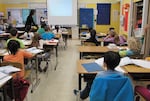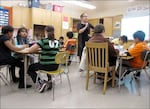Students in Portland’s language immersion programs become better readers than their counterparts in other schools, according to a new study called "Study of Dual-Language Immersion in the Portland Public Schools."

Chinese Classroom at Woodstock Elementary School
Rob Manning / OPB
The RAND Corporation and the American Councils for International Education compared language immersion students with other Portland students from 2004 through 2014.
Key Finding No. 1: Students randomly assigned to immersion outperformed their peers in English reading by about seven months in fifth grade and nine months in eighth grade.
Ten percent of students in Portland Public Schools are in language immersion programs. The programs are in a quarter of district schools, with potentially more on the way.
Michael Bacon, assistant director of Portland’s dual-language programs, said the data show a statistically significant advantage in reading by fifth grade for students in language immersion programs.
“Conservatively, it’s almost nine months – like a full school year of increased outcomes for kids," Bacon said. "It’s across the board, whether if you’re an English-only kid, or a Spanish speaker, or a speaker of the partner language.”
The reading benefits appear to be strongest for children in Spanish immersion programs.
The study found "no statistically significant benefit, but also no detriment, for math and science performance." But it found some evidence that Portland's "less commonly-taught languages" of Japanese, Chinese and Russian provide "modest math benefits."
Portland Public Schools' Vietnamese language program was added more recently, and wasn't included in the study.
Key Finding No. 2: Immersion students have 3-point lower rates of classification as English Language Learners (ELLs) by sixth grade, and this effect is larger (14 points) if students’ native language matches the classroom partner language.
That means the study shows students who come to school not fluent in English, and receive language supports, tend to learn English more quickly if they're in bilingual programs.

Bridger Elementary School (file photo)
Rob Manning / OPB
"Starting in fourth grade, we see a statistically significant greater chance that a kid will be exited out of ELL services, than those who are not," Bacon concluded.
Conversely, the study found English-speaking students "reach intermediate levels" of foreign language proficiency by Grade 8, "with somewhat higher performance in Spanish and Chinese... than in Japanese."
Research Significance: "Portland Public Schools provides an excellent test bed for studying dual-language education at scale, in part because it allocates its popular immersion slots using a random assignment lottery process."
The study is groundbreaking from a research standpoint, because of how Portland Public Schools enrolls students into its "focus option" or magnet programs, such as language immersion.
Bacon said that means the study eliminates what's called "self-selection bias."
"It is significant because it's the first time of really taking that 'self-selection' factor into account, and it really says, 'We're doing what we say we can do'," Bacon concluded.
The study included about 27,000 students, ranging in age from kindergarten to eighth grade, starting in the 2004-05 school year, using standardized test data in reading, math and science through 2013-14. Researchers also spent nearly 200 hours observing instruction in the 2012-13 and 2013-14 school years.
